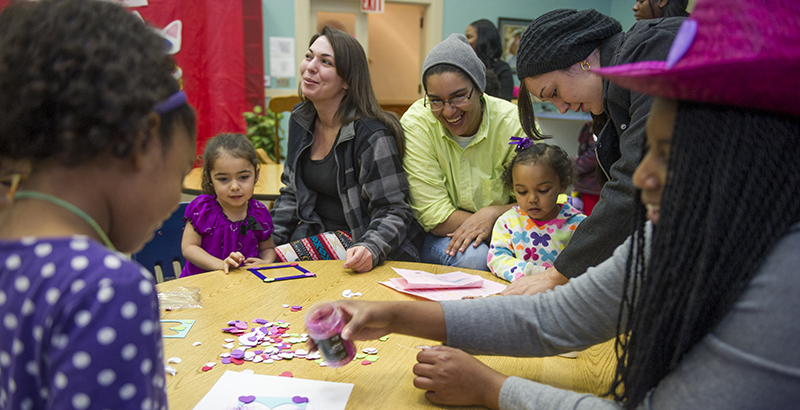Borrello & Hernandez: Making Family Engagement a Real Partnership for Boosting Student Achievement and Improving Schools

The importance of well-designed family, school, and community engagement in supporting children’s learning from cradle to career is well documented by a growing body of research. Beyond the research, it is reasonable — and some would say commonsensical — to conclude that parents, as their child’s first and primary teachers, offer the most expertise on their child.
However, what may seem like common sense has not been common practice. Historically, school reform efforts have disregarded the importance of engaging families and community. Professionals responsible for this important work are frequently isolated and relegated to low-status positions. Teachers, who bear the primary responsibility for contact with families, reveal that doing so is their No. 1 challenge and the area in which they feel least prepared. State education agencies, which have the responsibility of building the capacity of school districts and holding them accountable for effective engagement, often lack the capacity and expertise to support their success. Finally, from principals to secretaries of education, those with the greatest influence over policy often view engagement as good public relations instead of an authentic partnership to support student achievement and school improvement.
But there is good news. While there is much to be accomplished in addressing the systemic obstacles to advancing engagement, there also has been significant progress over the past several years.
For many years, educators viewed family engagement as fixing parents and rarely considered the role parents can play in a mutually beneficial relationship. The release of Head Start’s Parent, Family, and Community Engagement Framework in 2011 and the U.S. Department of Education’s Dual Capacity-Building Framework in 2012 communicated the importance of educators having the necessary capabilities, connections, cognition, and confidence to effectively engage families.
Statewide efforts in advancing family, school, and community engagement have historically been less than satisfactory. In 2011, the Education Department defunded the 16-year-old, $40 million Parental Information and Resource Centers initiative, the primary statewide capacity-building engine for advancing high-impact engagement in Title I schools and the communities most in need. However, effective advocacy around the reauthorization of the Elementary and Secondary Education Act, now called the Every Student Succeeds Act, enabled the creation of what are now called Statewide Family Engagement Centers. Although woefully underfunded at $10 million, the first awards were released in September 2018. ESSA also opens the door for families to be more involved in shared decision-making within schools. There is potential for modest progress in practice through ESSA.
Perhaps more significantly, other national associations have joined our organization, the National Association for Family, School and Community Engagement, in prioritizing advancement of engagement practice in states. The Council of Chief State School Officers engaged NAFSCE last year for help in establishing its State Consortium on Family Engagement. The consortium’s goal is to build the capacity of state education agencies to develop family engagement frameworks from birth through grade 12, which can serve as a road map for standards and pathways to advance engagement. The 19 states participating in this initiative, serving more than one-third of our nation’s students, demonstrate significant interest in engagement and are establishing diverse statewide stakeholder coalitions to co-develop and advance the framework. This is significant and potentially transformational progress.
The National Education Association is examining teacher preparation in response to 2011 research that suggests that teachers’ primary fear about why they may fail in their profession and ultimately leave it is their lack of preparation to engage families. (This suspicion among educators is reinforced by 2008 research that suggests that only 33 percent of teachers believe they have a satisfactory relationship with parents. Imagine the percentage in low-income communities where poverty and other complexities minimize effective family engagement. Is that number 10 percent — or even lower?)
NAFSCE and the NEA, with the support of the W.K. Kellogg Foundation, are conducting a national landscape assessment of state-teacher licensure requirements, identifying best practices in engagement training within institutions of higher education and recruiting states, colleges, and universities to develop a framework for providing that training. When teachers are prepared to engage families before they enter the classroom, we believe, engagement at all levels of education will be prioritized as the essential strategy we know it is to support child development, student achievement, and school improvement.
High-impact and systemic family, school, and community engagement is in its infancy. But we finally are moving the needle for policy and practice through federal legislation, statewide capacity-building efforts, and educator preparation. Our nation’s students will be more successful because of these efforts.
Vito Borrello is executive director of the National Association for Family, School and Community Engagement and former president of the New York-based Every Person Influences Children and the New York State EPIC Parent Information Resource Center. Reyna Hernandez is director of research and policy development at NAFSCE. She is a former school district community engagement parent facilitator and assistant superintendent at the Illinois State Board of Education.
This essay was produced in partnership with Carnegie Corporation of New York, which provides financial support to The 74.
Get stories like these delivered straight to your inbox. Sign up for The 74 Newsletter

;)